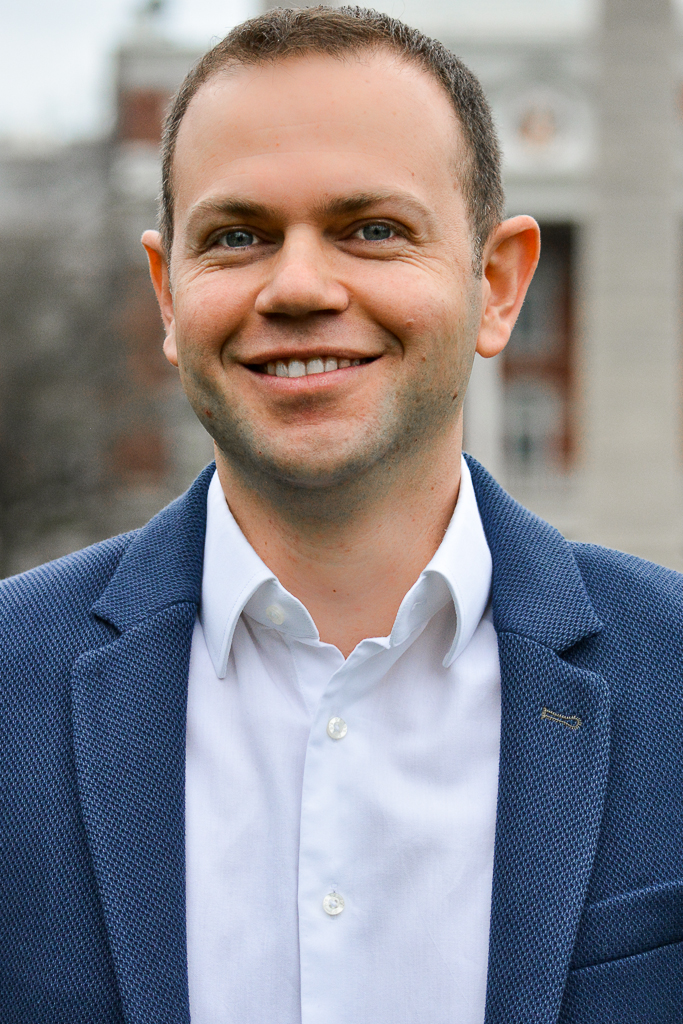GÖKÇE AYTULU
Istanbul, Turkey | Deputy Editor, Hurriyet newspaper
Host: The Kansas City Star
—By Olena Goncharova
The independence of Turkey’s news media has deteriorated significantly since Gökçe Aytulu got his start as an intern for CNN Turk a dozen years ago. Now, it seems appropriate that the aspiring journalist is working for a newspaper that means “liberty” in Turkish.
In 2003, Turkey was ranked 115th out of 180 countries in the World Press Freedom Index. Now, the country located at a crucial point between Europe and the Middle East is ranked 149th.
Aytulu said the battle for press freedom is continuous in Turkey. “Journalism is a unique profession,” Aytulu wrote in an essay. “We are directly responsible to the people. Our survival is critical for democracy — even more so, in developing countries such as mine.”
Gokce Aytulu (GO chay eye TOO loo) began his university studies in international relations and politics and considered following in his father’s footsteps and work in business. He didn’t plan to become a reporter.
A turning point in his career came after he read a book by Hasan Cemal, in which the former editor of Cumhuriyet newspaper in Turkey described his early years in journalism.
“Journalists deeply loved their jobs, that impressed me a lot,” Aytulu said. “I decided to become a journalist after that. … I did it my way; it’s better.”
After his internship, Aytulu went to work as a reporter for a newly launched business newspaper called Referans, modeled after the Financial Times, and became an editor. He was transferred to another Dogan Group publication. Radikal, which focuses on human rights, the Kurdish conflicts, freedom of speech and democracy, similar to The Guardian in its outlook.
Now he’s deputy editor-in-chief of the weekend papers for Hürriyet, the largest independent daily in Turkey. The newspaper founded in 1948 is the only publication in Turkey that is supervised by a Publishing Principles Committee, according to Aytulu, which “guarantees a nonpartisan, impartial reporting policy and set our ethical and editorial standards.”
The year in which he became a journalist, Recep Tayyip Erdogan was elected prime minister and he became president in 2014, a period in which Turkey’s free press has experienced difficult times. A year later, the country’s press status was labeled “not free” by Freedom House. News outlets critical of the government have been officially harassed, journalists have been arrested and are sometimes charged with espionage.
Hürriyet isn’t an exception. In September 2015, the newspaper’s building was attacked by a group of pro-government supporters. Carrying clubs and stones, the activists accused the newspaper of misquoting President Erdogan and intended to burn the offices.
The night after the attack, Hürriyet, published a story explaining the violence. It ends with the words: “We are journalists and we will continue to be. We know that there is a democratic state of law in this country. At least that is what the constitution said.”
Gökçe speaks with Global Journalist at the University of Missouri School of Journalism to discuss his experience as a journalist in a country like Turkey that plays a vital role in the development and understanding of Europe.
Another case involved two of Aytulu’s colleagues — Can Dündar, editor in chief of daily Cumhuriyet, Turkey’s up-market daily newspaper, and Ankara bureau chief Erdem Gül. The editors were imprisoned for publishing a story of arms deliveries by the Turkish Intelligence Services to Islamist groups in Syria. They were released months later.
“Being a journalist in Turkey is sometimes a dangerous job,” Aytulu, 35, said. “It’s a challenge.” Still, Aytulu believes challenges facing Turkey, including the war in neighboring Syria, tensions across the border in Iran, and the refugee crisis, are “treasures” for journalists who want to write about significant issues.
“My family and my colleagues sometimes worry about me, especially with investigative reporting results,” Aytulu said. Nevertheless, he’s not afraid of reporting on the issues that are of public interest.
As an editor, he tries to encourage his reporters to think about “big stories” and make them to “write less, but meaningful.” “When you’re reporting (yourself) you have to keep in mind what you’ve told to your reporters,” Aytulu explained.
Aside from his everyday job, Aytulu keeps working on his doctoral thesis on freedom of the press in the 1920s, the period when Turkey became a republic under the rule of Mustafa Atatürk.
During the fellowship, Aytulu is keen to observe how America’s newsrooms handle the “digital” challenge and hopes to become a part of global journalism community.
Aytulu recalls he was happy to learn that he was selected as an Alfred Friendly fellow.
His chief editor, Sedat Ergin, endorsed him. In an email, Ergin said that Aytulu is “one of the best and most promising journalists of his generation in our paper and an important asset for the future of our newspaper.”
Aytulu’s wife supported his long trip to the U.S. for the fellowship. “She encouraged me. She used to be a journalist, but now has joined the dark side and works in advertising,” he added with a smile. They are going to reunite for a holiday in July.
Aytulu recalled that he was concerned about accepting the fellowship because it meant he would spend half a year away from home. “Six months is a long time,” he said. “What will be going on in Turkey in six months, and when I come back, what country wilI I find? We live in a country that faces big issues all the time – wars, uprisings, corruption.”
But Aytulu believes the crackdown on press freedoms in Turkey cannot continue indefinitely because of the country’s history of media independence. “I’m not a pessimistic person; I look optimistically. This is not a sustainable thing for Turkey.”
He also wants journalistic standards to be raised in Turkey. “The Alfred Friendly Fellowship program promotes free and stronger press throughout the world, particularly in developing countries,” he wrote. “As a Turkish journalist, I find this very valuable.”
Aytulu believes it’s time for Turkish media to focus more on international issues. “Turkey has a crucial role in the world today. The Middle East, Syria, crisis in Islam, cannot be completely understood without understanding Turkey. … Turkey’s voice needs to be heard; Turkish journalists can no longer stay merely local. We have to reach the world. This will be one of my life’s mission.”
For more on the fellows’ interaction with journalism students at the University of Missouri click here.




